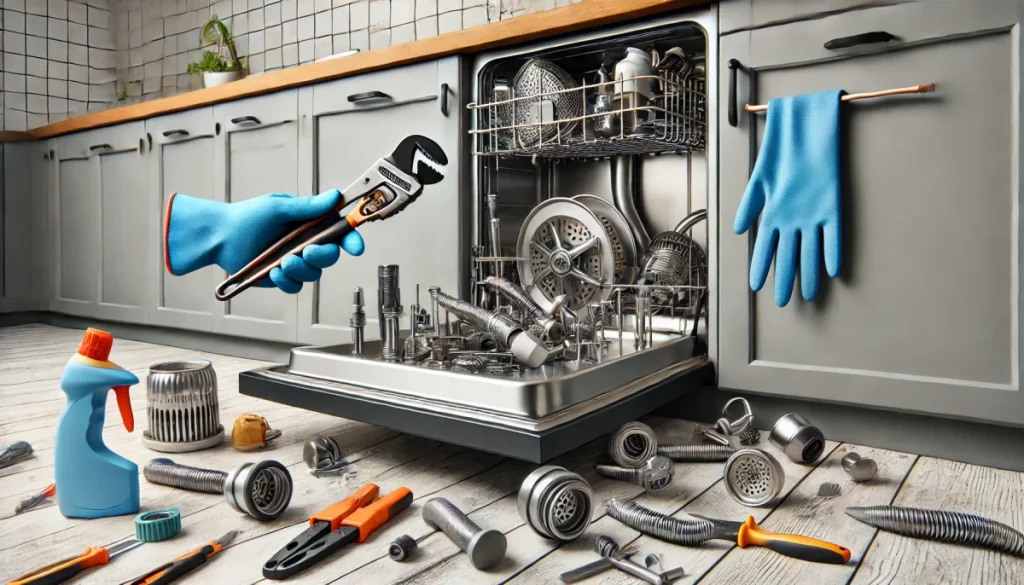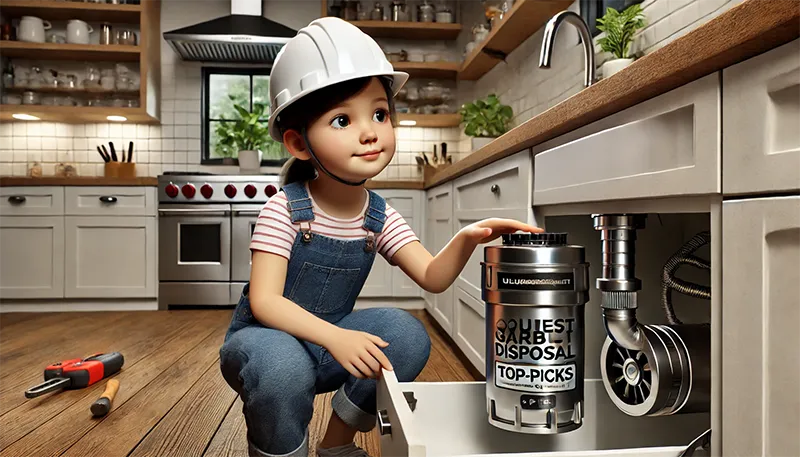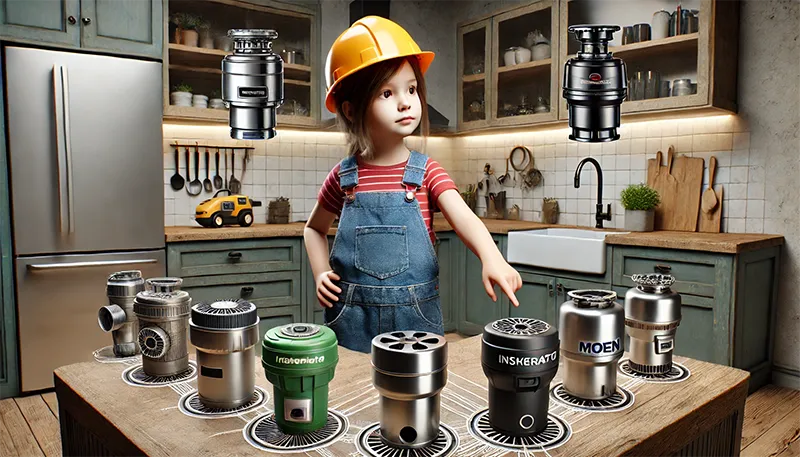A dishwasher is an indispensable appliance in any modern kitchen, making dishwashing more convenient and efficient. However, dishwashers can face common issues like clogs, which can affect their performance. If you’ve ever noticed water pooling at the bottom of your dishwasher or slow drainage, it’s likely due to a dishwasher drain clog. Left unaddressed, this problem can cause more significant plumbing issues and even damage your dishwasher.
A typical dishwasher uses around 3-5 gallons of water per load, which is much less compared to washing dishes by hand. However, if a dishwasher drain is clogged, this water has nowhere to go, leading to backup issues in your kitchen sink and possibly even your plumbing system.
The good news is that prevent dishwasher drain clogs is easy with proper care and regular dishwasher maintenance. In this guide, we’ll explore the most common causes of clogged dishwasher drains and offer essential maintenance tips to keep your appliance running smoothly.
Why Dishwasher Drain Clogs Happen
Understanding why dishwasher drain clogs happen is crucial for preventing them. There are several reasons why your dishwasher drain may become clogged, from food debris to grease and soap buildup. Here are the most common causes:
Food Debris
One of the leading causes of clogged dishwasher drains is food debris. While dishwashers are designed to handle small amounts of leftover food, larger pieces can block the dishwasher drain hose or accumulate in the filter. Over time, this buildup prevents water from draining properly.
Grease and Oil Buildup
Grease and oil from cooking can solidify when cooled, leading to grease clogs in dishwasher drains. These substances cling to the walls of the dishwasher drain hose, restricting water flow and causing slow drainage.
Soap and Detergent Residue
Using too much dishwasher detergent or the wrong type of soap can lead to soap scum buildup. Over time, soap residue mixes with grease and food particles, resulting in a clogged drain. Excessive soap use can also cause foam to back up into the dishwasher, affecting drainage.
Improper Loading or Overloading
Overloading the dishwasher prevents water from circulating properly. When water cannot reach all areas of the dishes, food particles remain and eventually clog the dishwasher drainage system. Always follow the manufacturer’s guidelines on how to load the dishwasher properly to prevent issues.
By identifying these common causes, you can better understand how to prevent dishwasher drain clogs and avoid costly repairs.
Essential Maintenance Tips to Prevent Dishwasher Drain Clogs
Routine dishwasher maintenance is key to keeping your appliance in top condition and avoiding clogs. Follow these essential tips to prevent dishwasher drain clogs and ensure smooth operation.
Tip 1: Clean the Dishwasher Filter Regularly
The dishwasher filter captures food particles before they enter the drain hose. If this filter becomes clogged with debris, it will affect the dishwasher’s drainage. Clean the filter at least once a month to prevent buildup. To clean the filter, remove it from the dishwasher, rinse it under warm water, and scrub it with a soft brush to remove any food particles and grease.
Tip 2: Run Hot Water Before Starting the Dishwasher
Running hot water at your sink before starting the dishwasher helps to dissolve grease and food particles, reducing the chance of a dishwasher drain clog. When the dishwasher starts with hot water, it can more effectively clean your dishes and flush debris down the drain.
Tip 3: Use Baking Soda and Vinegar to Keep Drains Clear
Natural cleaners like baking soda and vinegar are effective for maintaining a clean dishwasher drain. Every few months, pour one cup of baking soda and one cup of vinegar into the dishwasher’s bottom. Let the mixture sit for 15 minutes before running a hot cycle. This combination helps break down grease, soap scum, and food particles that can lead to clogs.
Tip 4: Avoid Overloading the Dishwasher
Overloading your dishwasher can block the spray arms, preventing water from circulating properly. This leads to food particles being left behind, which can enter the drain system and cause clogs. Avoid overloading the appliance and ensure the dishwasher drain system is not blocked by improperly loaded dishes.
Tip 5: Scrape Excess Food from Dishes
Scraping excess food from dishes before loading them into the dishwasher can prevent clogged drains. While dishwashers are designed to handle small food particles, larger debris can cause blockages. By removing food scraps beforehand, you reduce the risk of clogs in the filter and dishwasher drain hose.
These tips will help you maintain a clog-free dishwasher and ensure efficient water drainage with every wash cycle.
How to Clean and Maintain the Dishwasher Filter
The dishwasher filter plays an essential role in preventing food debris from entering the dishwasher drain hose. Keeping the filter clean will prevent clogs and ensure that your dishwasher operates efficiently. Follow these steps to clean the filter:
Step 1: Remove the Filter
Most dishwashers have a filter located at the bottom of the appliance. Twist the filter to unlock it, and then carefully lift it out of the dishwasher.
Step 2: Rinse and Scrub the Filter
Rinse the filter under warm running water to remove any trapped food particles. Use a soft brush or sponge to scrub away grease and debris. Make sure to clean the area around the filter compartment as well.
Step 3: Reinstall the Filter
Once the filter is clean, place it back into its slot and twist it to lock it securely in place. Regularly cleaning the dishwasher filter will prevent food buildup from clogging the dishwasher drain system.
Using Baking Soda and Vinegar to Keep Drains Clear
One of the easiest and most effective ways to prevent dishwasher drain clogs is by using natural cleaners like baking soda and vinegar. This method helps to break down food particles, grease, and soap scum that can accumulate in the dishwasher drain hose.
How to Use Baking Soda and Vinegar:
- Step 1: Sprinkle one cup of baking soda into the bottom of the dishwasher.
- Step 2: Pour one cup of white vinegar over the baking soda. The mixture will fizz, which helps dissolve grease and debris.
- Step 3: Let the solution sit for 15-20 minutes, allowing it to work through the dishwasher drain system.
- Step 4: Run the dishwasher on a hot water cycle to flush out the mixture and clear any remaining residue.
By using this natural cleaning solution every few months, you can keep your dishwasher drains clear and prevent future clogs without resorting to harsh chemicals.
Common Mistakes That Lead to Clogs
Even with regular maintenance, some mistakes can still lead to dishwasher drain clogs. Here are common pitfalls to avoid:
Forgetting to Clean the Filter Regularly
A clogged filter is one of the most common reasons for slow drainage. Make sure to clean your dishwasher filter monthly to avoid blockages in the drain system.
Not Running Hot Water Before the Cycle
Cold water can cause grease to solidify inside the dishwasher drain hose, leading to clogs. Always run hot water before starting a dishwasher cycle to prevent this.
Allowing Grease and Oil to Enter the Dishwasher
Grease and oil can easily solidify and cling to the walls of the dishwasher drain, causing blockages. Wipe down greasy pans and dishes before loading them into the dishwasher.
Overusing Detergent
Too much detergent can create soap buildup, which clogs the dishwasher drain system over time. Use only the recommended amount of detergent to avoid soap residue that leads to clogs.
By avoiding these common mistakes, you’ll ensure that your dishwasher drains properly and remains free of clogs.
FAQs
-
How often should I clean my dishwasher filter?
It’s recommended to clean the dishwasher filter once a month to prevent food particles from accumulating and causing clogs.
-
Can I use chemical drain cleaners to fix a clogged dishwasher drain?
It’s better to use natural cleaners like baking soda and vinegar to avoid damaging the dishwasher’s internal components. Chemical drain cleaners can be too harsh for dishwasher use.
-
Why is my dishwasher still clogging even after I clean the filter?
If your dishwasher continues to clog, check the drain hose and garbage disposal for blockages. A clogged drain hose or improper installation could be the cause.
-
How do I know if my dishwasher drain is clogged?
Signs of a clogged dishwasher drain include water pooling at the bottom, slow drainage, or foul odors coming from the appliance.
-
What foods should I avoid putting in the dishwasher to prevent clogs?
Avoid putting fibrous foods like celery, corn husks, and potato peels into the dishwasher. Also, avoid large food particles and grease, which can cause blockages in the dishwasher drain hose.
Conclusion
Preventing dishwasher drain clogs is easy with regular maintenance and proper use. By cleaning the filter, using hot water, and avoiding common mistakes, you can keep your dishwasher running efficiently for years to come. Implementing natural cleaning solutions like baking soda and vinegar will help maintain a clear dishwasher drain system and prevent future clogs.
Follow these essential maintenance tips today to avoid frustrating clogs and ensure your dishwasher continues to operate smoothly!



